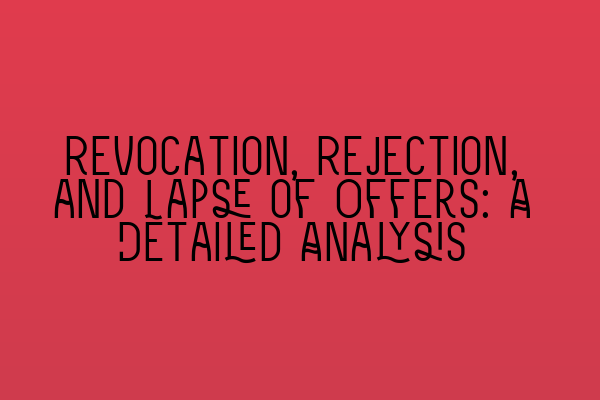Revocation, Rejection, and Lapse of Offers: A Detailed Analysis
In contract law, offers form the foundation of any agreement. It is essential for solicitors and law students to have a comprehensive understanding of the concepts surrounding offers, including revocation, rejection, and lapse. This blog post aims to provide a detailed analysis of these topics, shedding light on their significance in contract law.
Revocation of Offers:
One crucial aspect of offers is the ability to revoke them. Revocation refers to the act of withdrawing an offer before it has been accepted. It is important to note that an offer can be revoked at any time before acceptance, unless it is an irrevocable offer. An irrevocable offer is one that cannot be withdrawn for a specified period or until a particular event occurs.
Revocation can be communicated verbally, in writing, or through conduct. However, it is essential to ensure that the revocation is effectively communicated to the offeree. If the offer has been communicated through a third party, revocation must be communicated through the same means.
It is important to understand that the revocation of an offer is only effective when properly communicated. Therefore, if the offeree is unaware of the revocation and accepts the offer, a valid contract may be formed.
Rejection of Offers:
Rejection is another significant concept related to offers. It occurs when the offeree explicitly refuses to accept the offer. Rejection terminates the offer, and the offeror is no longer bound by it. It is important to note that rejection does not create a counteroffer. Instead, it simply terminates the original offer, allowing the offeror to make a new offer if desired.
Just like revocation, rejection must be properly communicated to be effective. The offeree must clearly and unequivocally reject the offer, leaving no room for ambiguity. Moreover, the rejection must reach the offeror before they receive notice of acceptance.
Lapse of Offers:
Offers can also lapse due to various reasons. A lapse occurs when the offer is no longer valid. There are three main ways in which an offer can lapse: expiration of a specified time period, failure of a specified condition, or by the lapse of a reasonable time.
If an offer specifies a particular time period within which it must be accepted, it will lapse if not accepted within that timeframe. Similarly, if the offer is subject to a certain condition, it will lapse if that condition is not fulfilled. Finally, if no time period is specified, an offer may lapse after a reasonable amount of time has passed. What constitutes a reasonable time depends on the circumstances of each case.
Importance of Understanding Revocation, Rejection, and Lapse:
Understanding revocation, rejection, and lapse is crucial for solicitors, law students, and anyone dealing with contract law. These concepts help determine the validity and enforceability of offers. By comprehending these principles, legal professionals can effectively advise their clients, negotiate contracts, and analyze case law.
Moreover, a deep knowledge of revocation, rejection, and lapse can enhance a solicitor’s ability to draft contract terms that protect their client’s interests. By anticipating potential issues in relation to offers, solicitors can draft clauses that minimize the risk of disputes and offer a clear path of action in case of revocation or rejection.
Conclusion:
Revocation, rejection, and lapse play vital roles in contract law. Solicitors and law students must have a firm grasp of these concepts to navigate the intricacies of offers successfully. By understanding when and how offers can be revoked or rejected, solicitors can effectively advise their clients, negotiate contracts, and ensure their client’s legal rights are protected. Furthermore, a thorough understanding of these concepts enables solicitors to draft well-crafted contract terms that minimize the occurrence of disputes. To delve deeper into the world of contract law, make sure to check out our related articles on SQE 1 Practice Exam Questions, SQE 1 Practice Mocks FLK1 FLK2, SQE 2 Preparation Courses, SQE 1 Preparation Courses, and SRA SQE Exam Dates.
